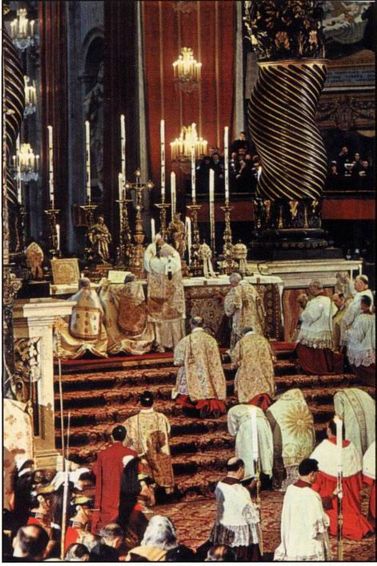
The Mass as an actual sacrifice in Catholic Tradition.
Fr Thomas Crean O.P. brings out a formal aspect of Catholic tradition concerning the sacrifice of the Mass, that seems to have been prominently neglected in recent times.
I want to consider a way of talking about the Mass which has become quite common in recent years and which isn’t exactly wrong, but which when presented as a definition of the Mass seems at least to involve a false emphasis, and which often seems to carry with it ideas about the Mass which I do think are mistaken.
I am talking about describing or defining the Mass as the renewal or re-presentation or re-actualization of the Paschal Mystery. While I don't say that such phrases can't be justified, I do think they need a lot of qualification which they don't always receive, and that without such qualifications, they are misleading. And there's no doubt that ‘the Paschal Mystery' is a phrase which is very popular in modern accounts of the Mass, or indeed of the liturgy in general. For example, the Italian Nuovo Dizionario di liturgia, published in 1988, speaking of the post-Vatican II liturgical reform, states that: 'the Paschal mystery has become the foundation of, and the key to, the meaning of the entire Christian liturgy'. Notice, there, the words, 'has become the foundation'; the implication is that it wasn't before, that this is something new. That may already give us pause: how can something become the foundation for the liturgy if it wasn't before? Or if we're meant to understand, not 'has become in reality' but rather 'always was in reality, but now has become so also in our understanding', that raises the obvious question, did the Church then previously have a deficient understanding of the liturgy and of the Mass? That would also be a problematic position for a Catholic theologian to adopt. Clearly we need to look at this phrase 'paschal mystery' rather closely, and see if it is simply a new and concise way of expressing what the Church has always held about the Mass, or if it is indeed expressing a new conception of the Mass, and if so, whether this new conception can be justified.READ...

 inundado por um mistério de luz que é Deus e N´Ele vi e ouvi -A ponta da lança como chama que se desprende, toca o eixo da terra, – Ela estremece: montanhas, cidades, vilas e aldeias com os seus moradores são sepultados. - O mar, os rios e as nuvens saem dos seus limites, transbordam, inundam e arrastam consigo num redemoinho, moradias e gente em número que não se pode contar , é a purificação do mundo pelo pecado em que se mergulha. - O ódio, a ambição provocam a guerra destruidora! - Depois senti no palpitar acelerado do coração e no meu espírito o eco duma voz suave que dizia: – No tempo, uma só Fé, um só Batismo, uma só Igreja, Santa, Católica, Apostólica: - Na eternidade, o Céu!
inundado por um mistério de luz que é Deus e N´Ele vi e ouvi -A ponta da lança como chama que se desprende, toca o eixo da terra, – Ela estremece: montanhas, cidades, vilas e aldeias com os seus moradores são sepultados. - O mar, os rios e as nuvens saem dos seus limites, transbordam, inundam e arrastam consigo num redemoinho, moradias e gente em número que não se pode contar , é a purificação do mundo pelo pecado em que se mergulha. - O ódio, a ambição provocam a guerra destruidora! - Depois senti no palpitar acelerado do coração e no meu espírito o eco duma voz suave que dizia: – No tempo, uma só Fé, um só Batismo, uma só Igreja, Santa, Católica, Apostólica: - Na eternidade, o Céu!